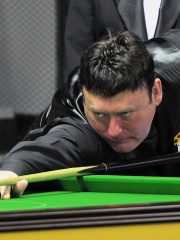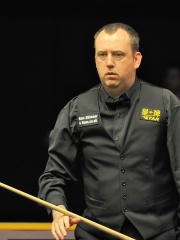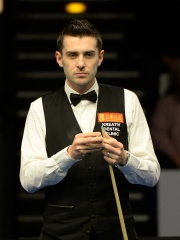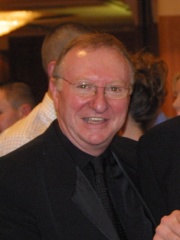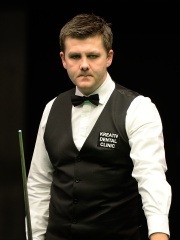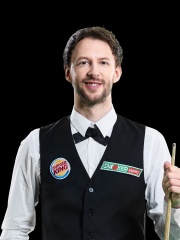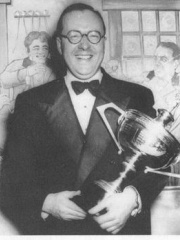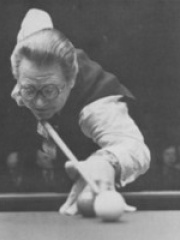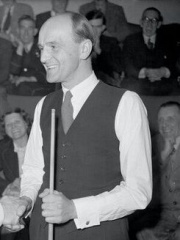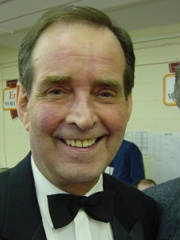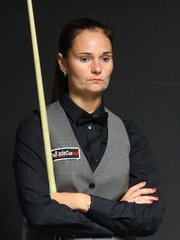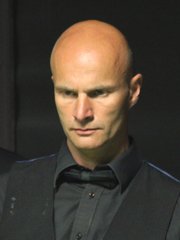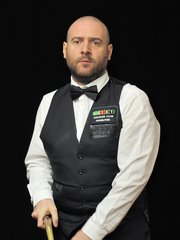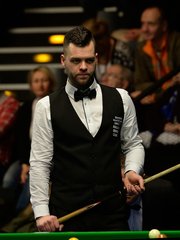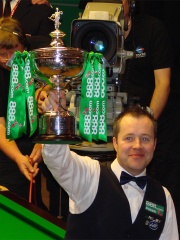
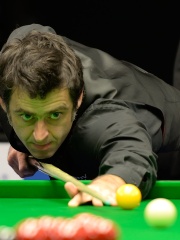
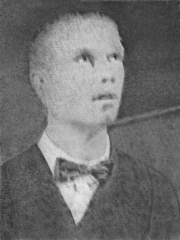
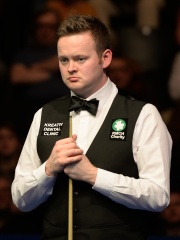
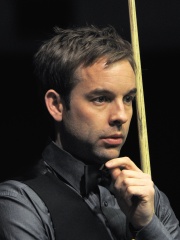
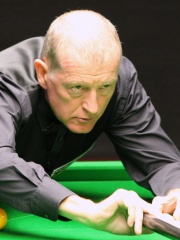
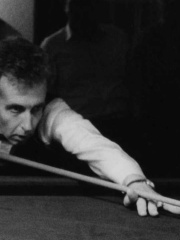

The Most Famous
SNOOKERS from United Kingdom
This page contains a list of the greatest British Snookers. The pantheon dataset contains 67 Snookers, 59 of which were born in United Kingdom. This makes United Kingdom the birth place of the most number of Snookers.
Top 10
The following people are considered by Pantheon to be the top 10 most legendary British Snookers of all time. This list of famous British Snookers is sorted by HPI (Historical Popularity Index), a metric that aggregates information on a biography's online popularity. Visit the rankings page to view the entire list of British Snookers.

1. John Higgins (b. 1975)
With an HPI of 64.39, John Higgins is the most famous British Snooker. His biography has been translated into 43 different languages on wikipedia.
John Higgins (born 18 May 1975) is a Scottish professional snooker player from Wishaw in North Lanarkshire. Since turning professional in 1992, he has won 33 ranking titles, placing him in third position on the all-time list of ranking event winners, behind Ronnie O'Sullivan (41) and Stephen Hendry (36). He has won four World Championships, three UK Championships and two Masters titles, for a total of nine Triple Crown titles, putting him level with Mark Selby and behind only O'Sullivan (23), Hendry (18) and Steve Davis (15). He first entered the top 16 in the 1995–96 world rankings and remained there continuously for over 29 years until September 2024, setting a record for the longest uninterrupted tenure as a top-16 player. He reached the world number one position four times. In 1994, two years after turning professional, Higgins won his first ranking event at the 1994 Grand Prix. He also won two more ranking events that season, the first teenager to win three ranking events in a single season. He reached his first Triple Crown final at the 1995 Masters losing to O'Sullivan, and then the 1996 UK Championship, losing on a deciding frame to Hendry. Two years later, at the 1998 World Snooker Championship, Higgins won his first World Championship, defeating Ken Doherty in the final. He won the UK Championship twice in 1998 and 2000 and the 1999 Masters before reaching the world championship final again at the 2001 World Snooker Championship, losing to O'Sullivan. Higgins won the World Championship again in 2007 and 2009, the UK Championship in 2009 and 2010 and the Masters in 2006. In 2010, a tabloid newspaper carried out a sting operation in Ukraine, in which it claimed to show Higgins and his then-manager arranging to lose specific frames in future matches for money. An investigation cleared Higgins of match-fixing allegations but the World Professional Billiards and Snooker Association found that he had brought the sport into disrepute by failing to disclose an invitation to breach the sport's betting rules and giving the impression of agreeing to it. Higgins was banned from professional competition for six months and fined £75,000. After winning his fourth world title in 2011, Higgins' form became less consistent and he has gone for lengthy periods without title wins. He reached three consecutive World Championship finals between 2017 and 2019, but lost each time, to Selby in 2017, to Mark Williams in 2018, and to Judd Trump in 2019. In the 2021–22 season, he lost five ranking finals. In the 2024–25 snooker season, Higgins won two ranking events in the same season for the first time since 2015. Higgins made his 1,000th professional century break at the 2024 English Open, becoming the second player, after O'Sullivan, to reach that milestone. He has made 13 officially recognised maximum breaks in professional competition, second only to O'Sullivan's 17. He also holds the record for the biggest time span between a player's first and most recent ranking tournament win, having won his first ranking event at the 1994 Grand Prix and his latest at the 2025 Tour Championship, 30 years and 165 days later. Alongside O'Sullivan and Williams, he is one of the three players known as the "Class of '92", who all turned professional during the 1992–93 snooker season.

2. Ronnie O'Sullivan (b. 1975)
With an HPI of 61.80, Ronnie O'Sullivan is the 2nd most famous British Snooker. His biography has been translated into 56 different languages.
Ronald Antonio O'Sullivan (born 5 December 1975) is an English professional snooker player. Widely recognised as one of the most talented and accomplished players in snooker history, he has won the World Snooker Championship seven times, a modern-era record he holds jointly with Stephen Hendry. He has also won a record eight Masters titles and a record eight UK Championship titles for a total of 23 Triple Crown titles, the most achieved by any player. He holds the record for the most ranking titles, with 41, and has held the top ranking position multiple times. After winning amateur titles including the IBSF World Under-21 Snooker Championship, O'Sullivan turned professional in 1992, aged 16. At the age of 17 years and 358 days, he won his first ranking event at the 1993 UK Championship and remains the youngest player to win a ranking title. He is also the youngest player to win the Masters, having claimed his first title in 1995, aged 19 years and 69 days. Now also noted for his longevity in the sport, he is the oldest winner of all three Triple Crown events, having won his seventh world title in 2022, aged 46 years and 148 days; his eighth UK Championship title in 2023, aged 47 years and 363 days; and his eighth Masters title in 2024, aged 48 years and 40 days. As of 2025, he has made a record 33 appearances in the final stages of the World Snooker Championship at the Crucible. O'Sullivan made his first competitive century break at age 10 and his first competitive maximum break at age 15. He was the first player to achieve 1,000 century breaks in professional competition, a milestone he reached in 2019 and which he has since extended to over 1,300 centuries. He has made the highest number of officially recognised maximum breaks in professional competition, with 17, and holds the Guinness World Record for the fastest competitive maximum break, compiled in a time of 5 minutes and 8 seconds at the 1997 World Championship. At the 2025 Saudi Arabia Snooker Masters, he became the second player (after Jackson Page) to make two maximums in the same match as well as the oldest player (aged 49 years and 253 days) to make a maximum in professional competition. During his career, O'Sullivan has experienced depression, mood swings, and drug and alcohol abuse. Known as a controversial and outspoken figure on the professional tour, he has been disciplined on several occasions by the World Professional Billiards and Snooker Association for his behaviour and comments. Outside his playing career, he has worked as a pundit for televised snooker coverage and has written crime novels, autobiographies, and a health and fitness book. He features in the 2017 miniseries Ronnie O'Sullivan's American Hustle and in the 2023 documentary film Ronnie O'Sullivan: The Edge of Everything. With Mark Williams and John Higgins, he is one of three players collectively known as the "Class of '92", who all turned professional during the 1992–93 season. A member of the World Snooker Tour Hall of Fame, he was appointed an OBE in 2016.

3. Paul Hunter (1978 - 2006)
With an HPI of 59.27, Paul Hunter is the 3rd most famous British Snooker. His biography has been translated into 30 different languages.
Paul Alan Hunter (14 October 1978 – 9 October 2006) was an English professional snooker player. He was a three-time Masters champion, winning the event in 2001, 2002, and 2004; on all three occasions, he recovered from a deficit in the final to claim the title on a deciding frame. He also won three ranking events: the Welsh Open in 1998 and 2002, and the 2002 British Open. Hunter was diagnosed with neuroendocrine tumours in March 2005, but he continued to play for several months after receiving the diagnosis. He died shortly before his 28th birthday in October 2006. A tournament in Fürth, Germany, was renamed the Paul Hunter Classic in his memory, and he was posthumously awarded the BBC Sports Personality of the Year Helen Rollason Award. In April 2016, the Masters trophy was renamed the Paul Hunter Trophy. He made 114 century breaks in professional competition, the highest of these a 146 in the 2004 Premier League tournament. During the 2004–05 season, Hunter attained a career-high ranking of world number four.

4. Shaun Murphy (b. 1982)
With an HPI of 58.51, Shaun Murphy is the 4th most famous British Snooker. His biography has been translated into 36 different languages.
Shaun Peter Murphy (born 10 August 1982) is an English professional snooker player who won the 2005 World Championship and has completed the Triple Crown. Nicknamed "The Magician", Murphy is noted for his straight cue action and his long potting. Born in Harlow, Essex, and raised in Irthlingborough, Northamptonshire, Murphy turned professional in 1998. His 2005 victory at the World Championship was considered a major surprise as he was only the third qualifier to win the title after Alex Higgins and Terry Griffiths. Since then, he has been runner-up at the World Championship three times, in 2009, 2015 and 2021. He has earned twelve ranking titles, including the UK Championship in 2009, which places him tenth on the all-time list of ranking tournament victories. He has also won twelve non-ranking tournaments, including the 2015 Masters (which completed his career Triple Crown) and the 2025 Masters. Murphy has earned over £4 million in prize money and has compiled more than 700 century breaks, including ten maximum breaks. His highest world ranking was number three, which he maintained for three seasons following the 2007–08 season.
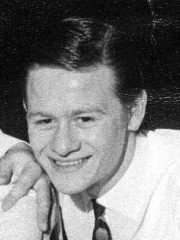
5. Alex Higgins (1949 - 2010)
With an HPI of 58.18, Alex Higgins is the 5th most famous British Snooker. His biography has been translated into 32 different languages.
Alexander Gordon Higgins (18 March 1949 – 24 July 2010) was a Northern Irish professional snooker player and a two-time world champion, remembered as one of the most iconic figures in the sport's history. Nicknamed "Hurricane Higgins" for his rapid play, and known as the "People's Champion" for his popularity and charisma, he is often credited as being a key figure in snooker's success as a mainstream televised sport in the 1980s. After turning professional in 1970, he won the World Snooker Championship in 1972, defeating John Spencer 37–31 in the final to become the first qualifier to win the world title, a feat that only three other players have achieved since: Terry Griffiths in 1979, Shaun Murphy in 2005, and Zhao Xintong in 2025. Aged 22, he was then the sport's youngest world champion, a record he held until 21-year-old Stephen Hendry won the title in 1990. Higgins was world championship runner-up to Ray Reardon in 1976 and Cliff Thorburn in 1980. At the 1982 event, he recovered from 13–15 behind to defeat Jimmy White 16–15 in the semi-finals, producing a 69 clearance in the penultimate frame which is regarded as one of the finest breaks in the sport's history. He defeated Reardon 18–15 in the final, winning his second world title ten years after his first. Higgins won the Masters title in 1978 and 1981 and the UK Championship in 1983, where he recovered from 0–7 behind to defeat Steve Davis 16–15 in the final. As of 2023, he is one of eleven players to have completed a career Triple Crown. He won the World Doubles Championship with White in 1984 and competed alongside Dennis Taylor and Eugene Hughes on the all-Ireland team that won the World Cup three consecutive times between 1985 and 1987. He won his last professional title at the 1989 Irish Masters, defeating Hendry 9–8 in the final. He failed to qualify for the professional tour in 1997–98 and played his last professional match in August 1997. Remembered for his turbulent lifestyle, Higgins was a heavy smoker, struggled with drinking and gambling, and admitted to using cocaine and marijuana. He had tempestuous relationships with women—both of his marriages ended in divorce, and he had widely publicised altercations with other girlfriends, one of whom stabbed him three times during a domestic argument. Known as an unpredictable, difficult, and volatile character, he was often disciplined by the sport's governing body, most notably when he was fined £12,000 and banned for five tournaments in 1986 after head-butting an official, and banned again for the entire 1990–91 season after punching another official and threatening to have Taylor shot. He was diagnosed with throat cancer in 1998 and died of multiple causes in his Belfast home on 24 July 2010, aged 61.

6. Ali Carter (b. 1979)
With an HPI of 57.61, Ali Carter is the 6th most famous British Snooker. His biography has been translated into 32 different languages.
Allister Carter (born 25 July 1979) is an English professional snooker player. He has twice been a World Championship finalist, in 2008 and 2012, losing both finals to Ronnie O'Sullivan. He has won six ranking titles and briefly reached number two in the world rankings in 2010. His nickname, "The Captain", comes from his hobby of piloting aeroplanes.

7. Steve Davis (b. 1957)
With an HPI of 56.40, Steve Davis is the 7th most famous British Snooker. His biography has been translated into 39 different languages.
Steve Davis (born 22 August 1957) is an English retired professional snooker player who is currently a commentator, DJ, electronic musician and author. He first turned professional in 1978 and dominated the sport in the 1980s, when he reached eight World Snooker Championship finals in nine years, won six world titles and held the world number one ranking for seven consecutive seasons. He also won the UK Championship six times and the Masters three times for a total of 15 Triple Crown titles, placing him third behind O'Sullivan (23) and Hendry (18). He won a total of 28 ranking titles during his career, placing him fifth on the all-time list, behind Ronnie O'Sullivan (41), Stephen Hendry (36), John Higgins (33) and Judd Trump (30). He is the only snooker player to have won the BBC Sports Personality of the Year Award, which he received in 1988. He was made an MBE in the 1988 Birthday Honours and elevated to OBE in the 2000 New Year Honours. Davis became widely known for his role in one of snooker's most famous matches, the 1985 World Championship final. Then the defending champion, he led Dennis Taylor 8–0 in the best-of-35-frame final, but Taylor recovered to tie the scores at 11–11, 15–15 and 17–17. The 68-minute deciding frame ended in a dramatic battle on the last black ball that attracted 18.5 million viewers in the UK, still the largest British television audience for any broadcast after midnight and any broadcast on BBC Two. Taylor potted the black to win the only world title of his career. Davis's terse responses in post-match interviews became the basis for a recurring caricature on the satirical British television show Spitting Image, which gave him the sardonic nickname "Interesting". Davis was the first player to make an officially recognised maximum break in professional competition, which he achieved at the 1982 Classic, and was also the first to earn £1 million in career prize money. During the 1987–88 season, he became the first player to win all three Triple Crown events in a single season, a feat that only two other players, Hendry and Mark Williams, have matched. He won his last major title at the 1997 Masters, aged 39, but continued to compete at a high level and was still a top-16 ranked player at age 50. He made the last of his 30 Crucible appearances in 2010, aged 52, when he eliminated the defending world champion John Higgins to become the oldest world quarter-finalist since 1983. He retired at the end of the 2015–16 season, after 38 seasons on the professional tour, but remains active as a commentator and analyst for the BBC's snooker coverage. Outside snooker, Davis competed in nine-ball pool tournaments, which included representing Europe in the Mosconi Cup eleven consecutive times between 1994 and 2004. A keen chess and poker player, he served as president of the British Chess Federation between 1996 and 2001 and competed in televised poker tournaments. In 2013, he featured as a contestant on I'm a Celebrity...Get Me Out of Here!, an ITV reality television series. A fan of progressive rock, he has an ongoing career as a radio broadcaster, club DJ and musician; with Kavus Torabi and Michael J. York, he co-founded the electronic music band the Utopia Strong, with which he has recorded several albums. He has authored and co-authored books on snooker, chess, cooking and music, as well as three autobiographies.

8. Terry Griffiths (1947 - 2024)
With an HPI of 56.35, Terry Griffiths is the 8th most famous British Snooker. His biography has been translated into 26 different languages.
Terence Martin Griffiths (16 October 1947 – 1 December 2024) was a Welsh professional snooker player, coach, and commentator. He won several amateur championships, including the Welsh Amateur Championship in 1975 and consecutive English Amateur Championship titles in 1977 and 1978, before turning professional in 1978 at the age of 30. Griffiths won the 1979 World Snooker Championship as a qualifier, defeating Alex Higgins in the quarter-finals, Eddie Charlton in the semi-finals, and Dennis Taylor 24–16 in the final. He was only the second qualifier to win the World Championship, after Higgins in 1972; only Shaun Murphy (2005) and Zhao Xintong (2025) have repeated the feat. He reached a second World Championship final in 1988, losing 11–18 to Steve Davis after being level at 8–8. Between 1984 and 1992, Griffiths reached at least the quarter-finals of the World Championship for nine consecutive years. He won the Masters in 1980 and the UK Championship in 1982, completing snooker’s Triple Crown. He was also runner-up at the Masters three times and reached the final of the 1989 European Open, losing the deciding frame to John Parrott. Later in his career, Griffiths focused on coaching and mentoring, serving as the World Professional Billiards and Snooker Association's director of coaching. He worked with several leading players, including Stephen Hendry, Mark Williams, and Ding Junhui. Griffiths retired from professional competition in 1997 and died in December 2024, aged 77, following a prolonged illness related to dementia.

9. Ray Reardon (1932 - 2024)
With an HPI of 56.32, Ray Reardon is the 9th most famous British Snooker. His biography has been translated into 32 different languages.
Raymond Reardon (8 October 1932 – 19 July 2024) was a Welsh professional snooker player who dominated the sport in the 1970s, winning the World Snooker Championship six times and claiming more than a dozen other professional titles. Due to his dark widow's peak and prominent eye teeth, he was nicknamed "Dracula". Until his mid-thirties, Reardon worked as a coal miner and then as a police officer while pursuing snooker at an amateur level. His titles during this era included six consecutive Welsh Amateur Championships from 1950 to 1955 and the English Amateur Championship in 1964. He turned professional in 1967 and became World Champion in 1970, 1973, 1974, 1975, 1976, and 1978; he was also runner-up in 1982. His other major tournament wins included the inaugural Pot Black tournament in 1969, the 1976 Masters, and the 1982 Professional Players Tournament. The first player to be ranked "world number one" when world rankings were introduced during the 1976–77 season, he held the position for the next five years. He regained the top ranking position in 1982, after which his form declined; he dropped out of the elite top-16 ranked players after the 1986–87 season. In 1978, Reardon became the oldest World Champion, aged 45 years and 203 days, a record he held for the next 44 years, until Ronnie O'Sullivan won his seventh world title at the 2022 event, aged 46 years and 148 days. Reardon became the oldest winner of a ranking title when he won the 1982 Professional Players Tournament aged 50 years and 14 days; his record endured for 43 years, until Mark Williams won the 2025 Xi'an Grand Prix at the age of 50 years and 206 days. Appointed a Member of the Order of the British Empire in 1985, Reardon retired from professional competition in 1991, aged 58. He never achieved a maximum break in tournament play; his highest break in competition was 146. During his retirement, Reardon served as president of Churston Ferrers golf club in Devon, where he was a member for over 40 years. He mentored O'Sullivan in preparation for his 2004 World Championship campaign, helping him lift his second world title. In 2017, the Welsh Open trophy was renamed the Ray Reardon Trophy in his honour. Reardon died from cancer in July 2024, aged 91.
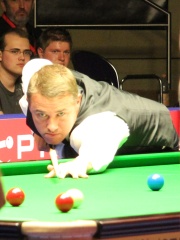
10. Stephen Hendry (b. 1969)
With an HPI of 56.12, Stephen Hendry is the 10th most famous British Snooker. His biography has been translated into 42 different languages.
Stephen Gordon Hendry (born 13 January 1969) is a Scottish former professional snooker player and a current commentator and pundit. One of the most successful players in snooker history, he turned professional in 1985, aged 16, and rose rapidly through the snooker world rankings, reaching number four in the world by the end of his third professional season. He won his first World Snooker Championship in 1990, aged 21 years and 106 days, making him the sport's youngest world champion, a record he still holds. He won seven world titles between 1990 and 1999, setting a new modern-era record that stood outright until Ronnie O'Sullivan equalled it in 2022. He also won the Masters six times and the UK Championship five times for a career total of 18 Triple Crown tournament wins, a total exceeded only by O'Sullivan's 23. His total of 36 ranking titles is second only to O'Sullivan's 41, while his nine seasons as world number one were the most by any player under the annual ranking system used until 2010. Hendry's five consecutive Masters titles between 1989 and 1993 and five consecutive world titles between 1992 and 1996 remain records in the modern era. His 36 consecutive victories in ranking events between March 1990 and January 1991 and his 29 consecutive wins at the Crucible between 1992 and 1997 also remain modern-era records. One of three players to have won all three Triple Crown events in a single season, he is the only player to have achieved the feat twice, in the 1989–90 and 1995–96 seasons. His 777 career century breaks include 11 maximum breaks, putting him in third place behind O'Sullivan (17) and John Higgins (13) for the most officially recognised maximums in professional competition. Awarded an MBE in 1994, he was twice named the BBC Scotland Sports Personality of the Year, in 1987 and 1996. Hendry's form became less consistent after his sixth world title in 1996 and his career declined in the 2000s, his play increasingly affected by the yips. He reached the last of his nine world finals at the 2002 World Championship but lost in a deciding frame to Peter Ebdon. He won his last ranking title at the 2005 Malta Cup and reached his last ranking final at the 2006 UK Championship, where he was again defeated by Ebdon. During the 2011–12 season, he fell out of the top 16 in the world rankings for the first time in 23 years. He qualified for the 2012 World Championship, where he made his 27th consecutive Crucible appearance, but he announced his retirement from professional snooker at age 43 following a 2–13 defeat to Stephen Maguire in the quarter-finals. After almost nine years in retirement, he returned to professional competition during the 2020–21 season under an invitational tour card. He played sporadically on the professional tour over four seasons but secured only three wins in 20 professional matches and retired again after the 2023–24 season. Hendry has also competed on the World Seniors Tour and has twice been a semi-finalist at the World Seniors Championship.
People
Pantheon has 59 people classified as British snookers born between 1907 and 1993. Of these 59, 50 (84.75%) of them are still alive today. The most famous living British snookers include John Higgins, Ronnie O'Sullivan, and Shaun Murphy. The most famous deceased British snookers include Paul Hunter, Alex Higgins, and Terry Griffiths. As of April 2024, 7 new British snookers have been added to Pantheon including Reanne Evans, Jak Jones, and Andy Hicks.
Living British Snookers
Go to all RankingsJohn Higgins
1975 - Present
HPI: 64.39
Ronnie O'Sullivan
1975 - Present
HPI: 61.80
Shaun Murphy
1982 - Present
HPI: 58.51
Ali Carter
1979 - Present
HPI: 57.61
Steve Davis
1957 - Present
HPI: 56.40
Stephen Hendry
1969 - Present
HPI: 56.12
Jimmy White
1962 - Present
HPI: 55.34
Mark Williams
1975 - Present
HPI: 54.67
Mark Selby
1983 - Present
HPI: 53.38
Dennis Taylor
1949 - Present
HPI: 52.47
Ryan Day
1980 - Present
HPI: 50.85
Judd Trump
1989 - Present
HPI: 50.67
Deceased British Snookers
Go to all RankingsPaul Hunter
1978 - 2006
HPI: 59.27
Alex Higgins
1949 - 2010
HPI: 58.18
Terry Griffiths
1947 - 2024
HPI: 56.35
Ray Reardon
1932 - 2024
HPI: 56.32
Fred Davis
1913 - 1998
HPI: 53.05
John Pulman
1923 - 1998
HPI: 52.06
Walter Donaldson
1907 - 1973
HPI: 50.52
John Spencer
1935 - 2006
HPI: 50.09
Willie Thorne
1954 - 2020
HPI: 40.23
Newly Added British Snookers (2025)
Go to all RankingsReanne Evans
1985 - Present
HPI: 37.45
Jak Jones
1993 - Present
HPI: 35.49
Andy Hicks
1973 - Present
HPI: 33.02
Jamie Burnett
1975 - Present
HPI: 32.60
Michael White
1991 - Present
HPI: 30.56
Jimmy Robertson
1986 - Present
HPI: 29.75
Jamie Jones
1988 - Present
HPI: 29.15
Overlapping Lives
Which Snookers were alive at the same time? This visualization shows the lifespans of the 8 most globally memorable Snookers since 1700.

